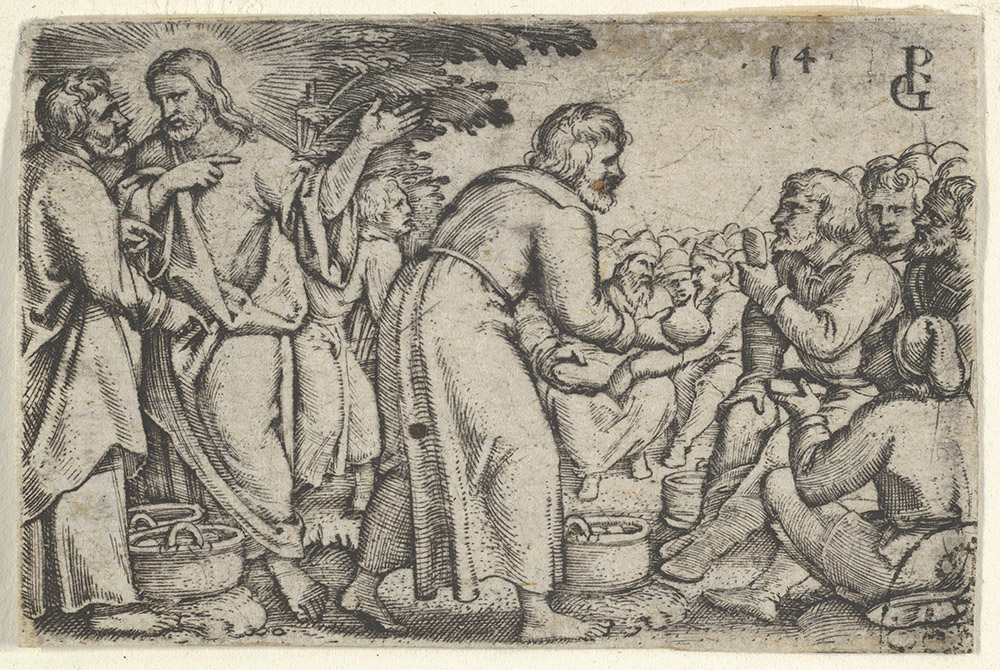
"The Miracle of the Loaves and the Fishes, from The Story of Christ," Georg Pencz, 1534–35, engraving (Metropolitan Museum of Art)
What do you do when disaster hits? Think back to the days when we first understood the seriousness of the COVID-19 pandemic. The crisis quickly initiated wide-ranging readjustments. The values we chose to act on, whether consciously or not, led us to such varied responses as hoarding, denial, selflessness and heroic action. We cheered first responders as if they were as important as sports figures.
Of course, we've seen similar responses after a hurricane, tornado, flooding, etc., but COVID-19 is unique in human history because it happened in the age of mass communication, making both its spread and our awareness of it immediate and universal. That combination sounds contradictory, and that's just one explanation of why it was so utterly disorienting.
The crowds who had followed Jesus and John were at least this disoriented when the news of John's death upended their world. Jesus himself had to refocus his ministry. The widely known story of how a lily-livered king ordered John's grisly death thrust everyone into a heartbreaking mixture of fear, mourning and bewilderment. Ominously, John's murder gave Jesus a double warning. First it demonstrated that anyone who criticized powerful people courted mortal danger. More tragically, John's entire life and mission were trivialized by the fact that his death resulted from nothing more profound than petty vengeance and a drunken oath. At the news of John's death, Jesus needed some time away.
As often happens in a Spirit-driven life, Jesus' retreat served him well, but not at all in the way he expected. Instead of finding the quiet he longed for, the crowds found him. He abandoned his wishes in the light of their anguish. Whatever he might have wanted to do after John's murder, the sight of the distressed people called him beyond his own need. Whatever his questions about his own ministry, the people gave him all the clarification he needed.
When the Gospel says that Jesus was moved to "pity," Matthew's vocabulary describes a stomach-churning response of compassion — a reaction probably comparable to what he felt at hearing of John's murder. This much of the story, the part we generally take as the introduction to the real action, is actually a summary of the entire incident and a theology of discipleship.
Matthew tells us that compassion led Jesus to spend the whole day attending to the people. Finally, his disciples reminded him that night was coming to the desert and the crowd hadn't eaten. (Little did they know that they were creating a variation on the scene of Jesus' original desert sojourn when Satan tempted him to worship power, to be the miracle-man and create bread from stone.) When the disciples perceived nothing more than the approach of night, Jesus saw that the hour had come to reveal the divine, nourishing power of self-emptying love. By saying, "Give them food yourselves," he invited his disciples to do what he had just done, to follow his example of unsparing generosity, to give away everything they had, even as they feared they had too little to offer.
Advertisement
Versions of this story occur six times in the Gospels, and not one account says that Jesus multiplied the bread. Instead, the narratives use the language we repeat in every Eucharistic celebration: Jesus took the bread, gave thanks, broke it and gave it to the disciples. The Gospel goes on to say that the disciples shared it with the crowd and all ate and were satisfied.
Why would this be the most oft-told story in the New Testament? The "miracle" here was not nearly as impressive as raising the dead, but those accounts aren't repeated like this one. Perhaps it's that this incident puts concrete details on the greatest promises Jesus made. Whether it was, "ask anything in my name and it will be given," or, "whoever believes in me will do the works that I do … and greater," this is the story of what happens when disciples do as Jesus did.
The disciples saw a need and expected Jesus to send people to fend for themselves. But that would have negated everything he had been doing. In the moment of crisis, Jesus allowed himself to be called forth by the needs of others. That action revealed him as the image of God, the Son who emptied himself (Philippians 2:7). Jesus invited his disciples to risk following him with the generosity and faith that gives all for the sake of others. When they did that, the crowd became a bread-sharing community whose hunger was satisfied.
The New Testament tells this story six times. Disciples in every age are called to bring it to a perfect seventh, leading a disoriented world to share until all are satisfied.
[St. Joseph Sr. Mary M. McGlone serves on the congregational leadership team of the Sisters of St. Joseph of Carondelet.]
